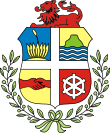CAPACITY BUILDING FOR THE IMPLEMENTATION OF THE SUSTAINABLE SDGs IN ARUBA

OPENBARE AANBESTEDING
CAPACITY BUILDING FOR THE IMPLEMENTATION OF THE SUSTAINABLE DEVELOPMENT GOALS (SDGs) IN ARUBA
BACKGROUND
The '2030 Agenda for Sustainable Development1 and the accompanying Sustainable Development Goals (SDGs) were adopted in September 2015 by the 193 United Nations (UN) Member States, who set an international framework for sustainable development to be reached by 2030 and strives for a balanced and sustainable development of countries, where the three dimensions of sustainable development; economic, social and environmental are taken into account. The SDGs cover 17 goals, 169 targets and 232 indicators.
The Kingdom of the Netherlands adopted the SDGs and the government of Aruba has committed to implement the SDGs on a national scale. The vision of the government of Aruba aspires to sustainable economic growth, a robust social welfare system, a strong focus on the marginalized in society, all the while in balance with the protection of the island’s natural resources in order to improve the wellbeing of its citizens and hence aligns with the SDGs. Therefore, the SDGs serve as a guideline for Aruba to shape its own sustainable development.
In this context, Aruba is working on adapting the SDGs to its national context for the effective implementation by 2030. The National SDG Commission is mandated by the Government of Aruba to provide strategic direction and to coordinate the implementation of the SDGs in Aruba, additionally an ‘Indicator Working Group’ (IWG) was created with the mandate to assess and localize the SDG indicators.
In 2017, the United Nations Development Program (UNDP), performed an assessment of Aruba in order to identify accelerator areas for implementation of the SDGs. Nine accelerators were identified for Aruba, which refer to priority areas that can directly address multiple development priorities and have a multiplier effect across the SDGs. Against this background the accelerators to ‘strengthen institutional quality and capacity’ and ‘strengthen statistical capacity2 are within the scope of this TOR.
The accomplishment of the SDGs in Aruba will entail the adaptation of the Global SDG agenda to the local context and to mainstream the SDGs throughout both the public sector and civil society. This will be a continuous process and will require for capacity to be built within the public sector and civil society with the aim of further shaping policy sustainably and strengthen implementation.
PURPOSE PROJECT
The challenges that the Agenda 2030 and the United Nations Sustainable Development Goals (SDGs) tackle are diverse and complex. Their integrated and transformative approach require a multidisciplinary and innovative way of working to implement the SDGs at the local, national, regional and international level. For Aruba, this means a new manner of doing things and entails re-skilling and teaching new competencies.
As identified in the ‘Roadmap for SDG Implementation for Aruba’, effective implementation of the SDGs requires competencies in the area of integrated policy and policy coherence as well as project management, including monitoring and evaluation and in particular statistical knowledge and IT skills for the public sector and NGOs. This was also identified during the Economic Commission for Latin America and the Caribbean’s (ECLAC) assessment on the challenges for producers of official statistics, data users and providers of data for Aruba3. In addition, a focus on collaboration, leadership, critical thinking and creativity and other 21st century skills are also essential to realize the ambitious, transformative, innovative, integrated and multidisciplinary SDG agenda. Capacity building to effectively support the implementation process therefore requires a broad approach and will have to be tackled at times simultaneously or in phases while targeting different levels within the relevant government entities and NGOs.
SCOPE
While Aruba has many strong and well-functioning institutions, the sheer scale of its ambition and efforts to implement the SDGs will require a broad approach and substantially improve the quality and statistical capacity of its public services and of NGO’s. Aruba will need to rapidly transform its civil servants into a high performing, data literate and IT skilled workforce with a mindset to drive the ambitions of the government to achieve the SDGs by 2030. A preliminary assessment made by UNDP in 2017, illustrates that for both the institutional quality and capacity, the statistical capacity is of priority2. Hence building statistical knowledge and complementary IT skills for the public sector and NGOs across the board are essential to implement the SDGs. Other necessary 21st Century skills and competencies include policy coherence and integrated policy making, project management, including monitoring and evaluation.
PROJECT OBJECTIVES
The services will contribute to the following objectives:
Phase A. The analysis and diagnosis phase through means of a gap analysis;
Phase B. Development of proposals with regard to the necessary capacity building in the public sector and NGOs in the areas of statistical knowledge, integral policy development and project management (including monitoring and evaluation). Please note that the TOR can be understood as a whole, or as three separate phases. In line with this, separate offers can be submitted per phase, depending on interest and expertise;
Phase C. Implementation of the capacity building program (mapping of priorities).
ACTIVITIES
The service provider will undertake the following activities:
Activities under Phase A would include:
- The analysis and diagnosis phase / gap analysis;
This phase serves as a starting point in order to carry out the next phases.
- The gap analysis is to diagnose and provide insight into the current human and institutional capacity in regard to statistical and complementary IT knowledge 4 of the public sector and NGO’s assessed towards the workforce skills necessary for the 21st century5.
- The aim of this phase is to diagnose the available human and institutional capacity, in regard to: integral policy development and project management, including monitoring and evaluation in relation to the workforce skills required for the 21st century; 6
This first phase is essential as it provides the evidence for writing proposals for closing the gap between the current situation and the desired capacity levels.
The duration of this phase is estimated at 8 weeks.
Activities under Phase B would include:
Development of proposals of the capacity building program for the public sector and NGOs in the areas of statistical science, IT competencies, policy coherence and project management, including monitoring and evaluation.
This phase serves to design the capacity building program and builds forth on the outcome of Phase A.
- The aim of this phase is to develop a curriculum and associated learning trajectory for the sustainable and continuous development of the institutional capacity in the areas of policy coherence, project management, including monitoring and evaluation, statistical science and complementary IT skills to foster an innovative and multi-disciplinary approach needed for the implementation of the SDGs.
The themes to be addressed in the program’s curriculum will be drawn from the proposals based on the gap analysis including, (non exhaustive list):
- Approached to policy coherence and integrated policy development;
- project management, including monitoring and evaluation;
- statistical capabilities7 and complementary IT skills;
- workforce skills necessary for the 21st century4 5.
The program development of the necessary educational courses, such as the curriculum design and the modules is estimated at 6 to 8 weeks.
Activities under Phase C would include:
- Implementation phase (mapping of delivery priorities based on proposed curriculum program in phase C);
This phase serves to effectuate the curriculum program and builds forth on the outcome of A and Phase B.
- The development of modules and a curriculum;
- Must include a train the trainers module for civil servants;
- Development of a syllabus and manual on the different modules to serve as reference material;
- Design a learning trajectory for the sustainable and continuous development of the institutional capacity in the areas of statistical science and complementary IT skills, integral policy development and project management, including monitoring and evaluation based on an innovative and multi-disciplinary approach for the implementation of the SDG;
- Offer the designed curriculum program through engaging, enthusing and relevant learning formats and methods;
- Offer this training through physical and digital learning environment that is blended (face-to-face and online).
- Must explore options to include local actors to carry out Phase C.
EXPECTED OUTPUT
The results are as follows:
- A gap analysis report to determine the level of human and institutional capacities for the execution of the SDG project. This will also have to include identified competencies that will close the 'gaps' between the current and the desired levels for the proposals of the capacity building process.
- Following the gap analysis, a program of courses should be developed for the provision of the necessary capacity building for the public sector and NGOs. These courses should ideally be integrated into higher education institutions to ensure sustainability and continuity.
- As a consequence of points 1 and 2, the institutional capacity of the government and NGOs will be increased.
Organization and implementation procedure
The National SDG Commission is appointed to lead, provide strategic direction and coordinate the process of SDG implementation in Aruba. Additionally, the commission can facilitate the process for engaging with international partners. The SDG Secretariat supports the commission.
Terms of Payment
In full consideration for the complete, satisfactory and timely performance by the contractor, the terms of payment of the to be signed agreement will be according to the established rules and procedures of the Government of Aruba.
- To facilitate the selection procedure, please provide us with a sample or reference of your previous work related the project’s expected output.
- Possible methodologies to be used for the baseline study should be indicated.
- CVs of the main consultants to be leading and executing the project as well as a clear expected timeline of project execution should be provided.
- Please send your quotation within 35 days of the publication of the TOR.
Your Offer should be submitted latest on December 5, 2018 at 12.00 pm (Aruban time)
Offer has to be send by email to the following email address: info@sdgaruba.com
NOTE: Please note that in submitting your offer, the TOR can be understood as a whole, or in separate phases, depending on interest, expertise and capacity of your organization. If you submit separate proposals, please clearly indicate for which phase(s) you will be submitting.
- United Nations (2015). Transforming Our World: The 2030 Agenda For Sustainable Development.
- United Nations Development Programme (2017). A Roadmap for SDG Implementation for Aruba.
- Economic Commission of Latin America and the Caribbean (ECLAC) (2018) Report of SDG Mission to Aruba on Planning for the Implementation of the 2030 Agenda for Sustainable Development.
- International Monetary Fund (2010). Conference on Data Quality for International Organizations, Data Quality Assessment Framework Box 2 Content of the Framework.
- McKinsey Global Institute (2018). Skill Shift: Automation and the Future of the Workforce.
- World Economic Forum (2016). The Future of Jobs: Employment, Skills and Workforce Strategy for the Fourth Industrial Revolution.
- In accordance with the Fundamental Principles of Official Statistics of the United Nations Statistical Commission (1994)
